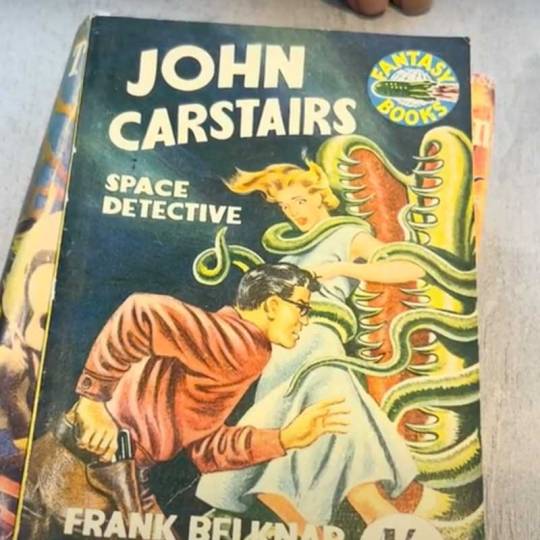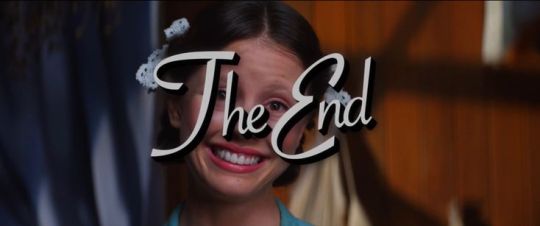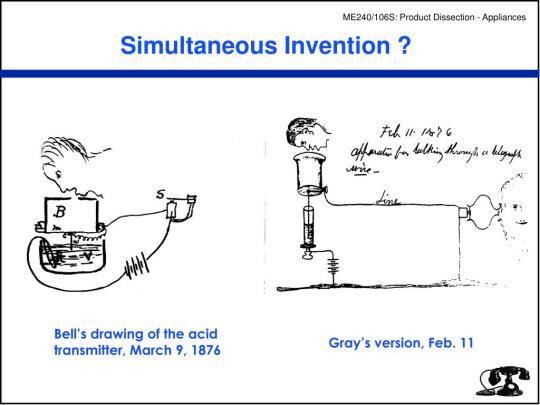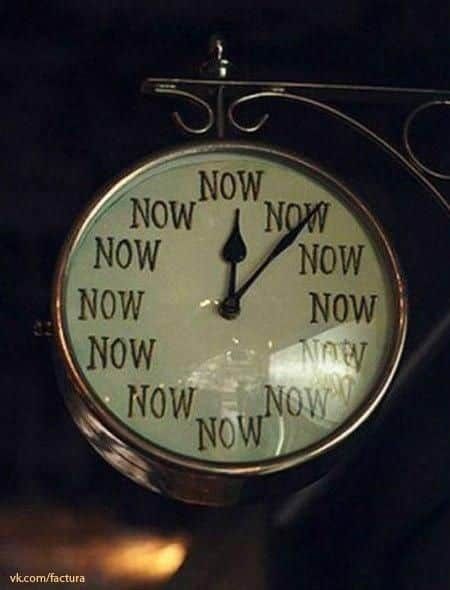#1950s British Science Fiction
Explore tagged Tumblr posts
Text
Exploring Detective Fiction written by SF writers
Phil Harbottle has reignited his brilliant YouTube videocast series about SF publishing, by diverging into documenting the work of SF writers such as John Russell Fearn in other genres – specifically, detective fiction.
Philip Harbottle, one of the most knowledgeable authors I know when it comes to SF publishing here in the UK, previously delighted us with his enjoyable videocasts charting the ups and downs of 1950s British Science Fiction publishing. More recently, he’s diverged into documenting the work of SF writers such as John Russell Fearn in other genres – specifically, detective fiction. “In my previous…

View On WordPress
#1950s British Science Fiction#Detective Fiction#Detective Fiction by Science Fiction Writers#downthetubes News#EC Tubb#John Russell Fearn#Phil Harbottle
2 notes
·
View notes
Text

#Peter Cushing#Christopher Lee#The Curse of Frankenstein#1950s#Hammer Films#horror#science fiction#gothic#Mary Shelley#British cinema#tw: choking
10 notes
·
View notes
Text

I paid less than 20% than what this is worth from an Ebay seller who doesn't regularly sell books. I've gotten some of my best deals this way.
A book you very likely don’t have on your shelf #467
Cover by Maurice Bramley -- 1950
#1950#1950's#1950s#british paperback#cover art#book cover#paperback#vintage paperback#science fiction#scifi#sci fi#sci-fi#ephemera
8 notes
·
View notes
Text
On July 27, 2012, The Gamma People was screened as a single feature on TCM Underground.

Here's some new art to mark the occasion!
#tcm underground#the gamma people#john gilling#science fiction#1950s sci fi#1950s#british film#50s sci fi#sci fi#sci fi art#midnight movies#cult cinema#movie art#art#drawing#movie history#pop art#modern art#pop surrealism#cult movies#portrait#cult film
3 notes
·
View notes
Text
Terror from the Clouds: Unveiling the Chilling Legacy of The Crawling Eye
“The Crawling Eye,” also known as “The Trollenberg Terror,” is a 1958 British science fiction horror film directed by Quentin Lawrence. This movie, adapted from a successful British TV serial of the same name, stands as a prime example of mid-20th century science fiction cinema. It combines elements of horror, mystery, and science fiction to create a tense and atmospheric narrative that…
#1950s science fiction#B-movies#British science fiction#Creature Features#Forrest Tucker#Janet Munro#Monster movies#Quentin Lawrence#The Crawling Eye#The Trollenburg Terror
0 notes
Text






The Electronic Monster (1958)
A movie revolving around the concept of a machine capable of replaying a recorded full sensory input directly into someone's mind. A concept that is very interesting, and very ahead of its time. Perhaps a little too ahead of its time, as a lot of the themes explored in later films like Strange Days were just not concepts at the time. And as such, the whole "Electronic dream therapy" ends up being more of a plot device than a main focus. So it's got a really cool idea, but just doesn't know what to do with it.
4/10
#science fiction#4/10#1950s#horror#horror movies#1950s horror#50s horror#1950s sci fi#50s sci fi#The Electronic Monster#Escapemetn#British horror
1 note
·
View note
Text
An author stole my book idea
What do you do when someone else publishes your book?

I was scrolling on my phone, browsing a selection of soon-to-be-released books when one in particular caught my eye.
I read the blurb and let out an audible gasp.
The author stole my book idea.
This man who I’ve never met, somehow managed to reach inside my brain, pluck out my story idea, write the book I am writing right now, and turn it into a fully fledged novel. He beat me to print, and now the novel I’ve been working on for the last few months is headed for the trash because how can I continue to write a story that has already been written?
It feels like my “life's work” has been stolen, cruelly whipped away from me overnight. The story that has been building and percolating inside me for years, preparing itself to arrive in my brain and out onto the page.

An accurate depiction of me discovering someone else is publishing the book I’m writing
Although, it’s possible that he didn’t actually steal my idea. It’s probable even because he couldn’t have. I don’t even know the guy. The far more likely scenario is that it is just an astonishing coincidence. He happened to have the exact same book idea at the same time as me, but the difference is: he’s a well known, successful, professional crime writer who actually managed to finish the story (and probably did a fantastic job), and I am an unpublished novice writer, who punches out a few hundred words here and there when inspiration strikes.
The best theory as to what has happened is that I have become the victim of a phenomena known as “simultaneous invention”.
Simultaneous invention is the concept that inventions and ideas are conceived independently by different creators, but at the same time.
“Rather than being the products of the individual mind, multiples (aka - simultaneous discoveries) are said to prove that creative ideas are the effects of the zeitgeist, or spirit of the times. At a specific instant in the history of a domain, the time becomes ripe for a given idea. The idea is “in the air” for anyone to pick, making its inception inevitable.” - Dean Keith Simonton, creativity researcher

There are mind-boggling cases of simultaneous invention documented throughout history. Here are some of the most famous instances:
1600s: Isaac Newton and Gottfried Leibniz both discover calculus.
1770s: Carl Wilhelm Scheele and Joseph Priestley discover oxygen.
1800s: Charles Darwin and Alfred Russel Wallace both describe natural selection.
1839: Louis Daguerre and Henry Fox Talbot invent the first photographic methods.
1869: Louis Ducos du Hauron and Charles Cros present the earliest workable methods of colour photography on the same day.
1876: Elisha Gray and Alexander Graham Bell independently, on the same day, filed patents for invention of the telephone.
1879: British physicist-chemist Joseph Swan independently developed an incandescent light bulb at the same time as American inventor Thomas Edison was independently working on his incandescent light bulb.
1950s: Jonas Salk and Albert Bruce Sabin invent the polio vaccine.
2015: Takaaki Kajita and Arthur B. McDonald are jointly awarded the Nobel prize for finding that neutrinos have mass.

It sounds like something from a Blake Crouch novel. The idea that two complete strangers, anywhere in the world could come up with the exact idea at the same time. It would be written off as pure science fiction if it weren’t so thoroughly documented.
It came for Charles Darwin, it came for Alexander Bell, and now, it has come for me.
Since I’ve had a solid 48 hours to walk around the house moaning in despair, I figure it’s probably time to put my big girl pants on and think about what to do next.
What does one do when someone else publishes the book you were going to write?
If there’s one thing this sad experience has taught me, it’s this: Do not sleep on that creative idea.

I thought I had all the time in the world to write my story. Donna Tartt took 9 years to write The Secret History, after all. Maybe I could take 9 years to write my debut novel too. But modern life and our shared experience may lead to someone else coming to the same conclusions – or ideas – as you have, somewhere in the world.
This doesn’t just apply to writing. It can happen in any field where creativity and imagination are at play.
Where does this leave me and my manuscript? I think I’ll hold onto it a little longer before sending it to my computer’s trash bin forever. Even though the original premise and core of the story is no longer viable, perhaps there’s something there worth saving. Maybe a shift in perspective or narrative voice. Could it be a white collar crime thriller instead of a murder? Could I set it in a different era? Could I change the genre? Who knows. Maybe this whole saga is a good thing and will force me to pivot. Now, I’m compelled to look at how I can better improve upon what the story was set to become.
One of the people in my writer's group said that this isn’t necessarily a bad thing. If his book sells well, publishers will be frothing to produce more of the same. That said, I’m not sure how I feel about being the runner-up for the prize of cool and interesting story ideas.
So what’s the solution to this confounding mystery of the human mind? How can you ensure your work remains true and original to you when at any point in time, some random person out in the world might be working on the exact same thing?

Maybe the answer is to simply try and be the first to launch, and to do your best not to let perfectionism hold you back from getting started. Maybe done is better than perfect. Or, if you instead find yourself in the same boat as me, is there room to move and change your approach? Could you see it as an opportunity to pivot and find a fresh, unexpected angle?
The truth is, I was stuck in a bit of a rut anyway. I fell out of love with the story idea a few weeks back. When I started writing months ago, I kicked off with a hiss and a roar, smashing my daily word count goal and picking up steam until I hit a wall. I didn’t like the characters and writing became a slog. Instead of feeling inspired and excited by the story, I felt bored and disillusioned. It became something I thought I simply had to finish to avoid the “sunk cost fallacy”.
This uncanny coincidence has forced me to open doors to new possibilities with the story that I hadn’t allowed myself to consider before. Now that the original plan has gone out the window, the idea of returning to the old draft feels strangely exciting again. Like anything is possible and the book could go in any direction.
But I guess you’ll just have to wait and see… Maybe I’ve already said too much.
#book blog#bookish#bookblr#booklr#bookworm#bibliophile#books#books and reading#authors#writer stuff#my writing#writeblr#writers on tumblr#writing#writers and poets#writerscommunity#female writers#writers#author#essay#personal essay#substack#fiction#essay writing
20 notes
·
View notes
Note
I love your work so much! It is so hot and delightful at the same time. I have been inspired to try and make my own erotica. Though, I've hit a bit of a hiccup while writing...how do you describe genitalia in a way that is still titillating (no pun intended) but not too anatomical? Is there a smut thesaurus somewhere I can thumb through (no pun intended)? Or do you have just a handful of words that are your favorite (no pun intended)?
at one point somebody did a really in depth survey to determine what language for genitals people found the most palatable in prose and i wish i ever saw the results. you can go look that up if you like i'm in bed and can't be bothered
but to answer your question myself (and give purely my own opinion), it depends entirely on the tone and time period you're writing in. cock is timeless and always works. prick is good for anything pre 1930s, unless it's set in england in which case i believe it's always appropriate. dick wasn't in use for penis until after 1880 but even then i don't prefer it until at Least after 1950. erection is fine, if a bit cold, and should be used wisely. i think it's at its best when the clothes are still on and you're referring to a boner in the abstract (also don't use boner unless it's Very modern and irreverent). anything else like rod or piece or whatever depend on context. shaft is perfectly fine when you're literally describing the shaft but i wouldn't use it to refer to the whole thing. then you've got tip/head, always fine. and balls is balls. you don't need to get fancy with them.
as for vajeen: pussy and cunt are your main players, get used to them, they are your friends. pussy is slightly more modern and casual feeling. cunt will feel more historical and less cute, more serious. determine the tone of your scene and the type of person in your POV and choose accordingly--but it is okay to use them interchangeably depending on the rhythm of the sentence. otherwise you really don't need to get fancy with the language (unless the tone calls for it). clit is a clit, or a bud or a button or whatever else. preferably not clitoris, but again there's places it would be appropriate. labia can be called labia and i genuinely think it's fine, though i usually go for lips just because it's slightly nicer. and then you have entrance or hole which depend on the tone (i prefer entrance but if you're writing somebody being demeaned or humiliated, you would go for hole)
and asshole is asshole or just ass. there's not really much to be done about that one. arse if you're feeling british but i feel like it just clocks you as not being british to do that.
basically your take away should be that you need to think about the tone and context of what you're writing, AND whose pov you're writing in and what terms THEY might use, and choose according to that. if i were writing a free spirited woman in a science fiction she would probably use pussy, whereas most of the time while writing roger, a turn of the century trans man, i believe i mostly used cunt, because that felt more period appropriate (though i relaxed on that over time and included pussy). you can make most things work if they're in the right environment. except gash. nobody wants to read the word gash.
145 notes
·
View notes
Text
WHAT IS THE GREAT SILENCE??
Blog#326
Saturday, August 26th, 2023
Welcome back,
The Fermi Paradox refers to the dichotomy between the high probability that extraterrestrial intelligence exists and the fact that we have no evidence for such aliens.
This paradox was described by the late British science-fiction author, Sir Arthur C. Clarke, who said: "Two possibilities exist: Either we are alone in the universe or we are not. Both are equally terrifying."

Many experts have grappled with the same question. Why, considering the multitude of planets and stars in the Milky Way, have we not heard from anyone?We call this problem the Fermi Paradox, and there are a number of possible solutions — some more unnerving than others …
The Fermi Paradox is a problem that asks, where are all the aliens in the universe? If life is so abundant, why haven't we been visited by, or heard from, anyone else?

According to NASA, in just the last two decades we have found more than 4,000 planets beyond our solar system, with trillions of stars thought to exist in our galaxy — most of which host their own planets.
Considering life sprang up on Earth, would we not have expected it to start in at least one other location in the last 14 billion years of the universe?
The Fermi Paradox was devised by the Italian-American physicist Enrico Fermi, according to the Planetary Society.

He is said to have come up with the idea in a throwaway remark over lunch with colleagues in 1950 when he asked "Where is everybody?"
He wondered, given that our planet was relatively young compared to the universe, we might have expected someone to have visited us by now — but we had no evidence of that ever occurring.

Fermi died four years later, in 1954, so did not have long to ponder the question. But his idea has sparked whole fields of science hoping to solve the problem, including the search for extraterrestrial intelligence (SETI).
There are a number of solutions to the Fermi Paradox. The most obvious, and likely, is that we simply haven't looked hard enough to find other life, and interstellar travel between stars is difficult.

The first planets beyond our own solar system were only discovered in the 1990s. This means we have barely started to scratch the surface of studying other worlds.
For example, we are yet to find many planets that look exactly like Earth, orbiting stars like our sun — but upcoming telescopes are hoped to be capable of such detections in the coming decade or two.

Even then, the distances between star systems are enormous, making journeys between them difficult. Our closest star system for example, Alpha Centauri, is four light-years away. The distance from Earth to Neptune, for comparison, is 0.0005 light-years — a journey that would still take us decades with current technology.
Intelligent aliens might simply have decided to never visit us, or did so long ago without leaving any trace.

Alternatively, it might be that life is simply so rare that the chances of two intelligent species being positioned relatively near each other in the vastness of space is exceedingly slim.
A more somber suggestion is that we are alone in the universe. Life, like that found on Earth, is simply so vanishingly unlikely to arise, that ours was the only world where this happened.

Most scientists think this is unlikely. But there is the possibility that some sort of event, known as a Great Filter, might prevent civilizations like our own from progressing far enough to make contact elsewhere.
Originally published on livescience.com
COMING UP!!
(Wednesday, August 30th, 2023)
"HOW DOES THE CONCEPT OF TIME CHANGE IN THE PRESENCE OF STRONG GRAVITATIONAL FIELD??"
#astronomy#outer space#alternate universe#astrophysics#universe#spacecraft#white universe#space#parallel universe#astrophotography
42 notes
·
View notes
Text

It's perhaps unsurprising, but due to Albert Einstein's infamous socialist politics, pacifism, and anti-segregationist views did not endear him to the American establishment, even before he emigrated to the United States.
Starting with an attempt by the "Woman Patriot Corporation", an anti-feminist and antisemitic organisation comprised of establishment East Coast folk, who attempted to block his arrival to the United States with a variety of excuses ranging from his supposed Communist views to their objection with his theory of relativity itself, which they claimed was deliberately constructed to leave “… the laws of nature and the principles of science in confusion and disorder.”
Naturally as the Cold War geared up in the late 1940s, early 1950s, FBI Director J. Edgar Hoover ordered the creation of a file on Einstein's "disruptive views", culminating in a file some 1,800 pages long about his connections with civil rights activists, communist-affiliated person and so on in an effort to collect the evidence they felt they needed to deport the physicist for being an "undesirable alien".
What is perhaps surprising is how just how shoddily put together the file is, with some details coming from unreliable sources, such as the claim that it was Einstein that got Klaus Fuchs (a German physicist who was part of the British contingent on the Manhattan Project, who also leaked atomic secrets to the Soviet Union) which was no only untrue but was sourced from Fuchs' sister, Kristall, who at the time was receiving treatment in a mental hospital.
Additionally, considerable resources were spent trying to prove the existence of a fictional son of Albert, called Albert Einstein Jr. (he had no children of that name), who was supposed to have some sinister connections with the Soviet Union despite the whole... you know... not existing thing.
In the end, despite Hoover wiretapping Einstein's phones and having people go through his mail, they were unable to build enough of a case to kick Albert of the country like they had done with his friend, the very left-leaning English actor Charlie Chaplin (It's a whole thing).
It's somewhat ironic that in their focusing on his, in modern terms, good qualities they passed over various publicly known things that would have gotten him criticism in the present. Such as his shoddy treatment of his wife or how his diaries displayed a lot of shockingly racist views of Asian people while he traveled the continent for the first time in the early 1920s (this latter case being something he supposedly got better with as he met more people).
26 notes
·
View notes
Text
Birthdays 1.2
Beer Birthdays
Peter Schoenhofen (1827)
James W. Kenney (1845)
Fal Allen (1961)
Erika Bolden (1985)
Five Favorite Birthdays
Isaac Asimov; science fiction writer (1920)
Lynda Barry; cartoonist (1956)
Kate Bosworth; actor (1983)
Diane Lane; actor (165)
Sally Rand; dancer, stripper (1904)
Famous Birthdays
Nathaniel Bacon; led Bacon's Rebellion, Virginia (1647)
Jim Bakker; televangelist (1939)
Josh Baskin; character in film "Big" (1975)
Ernst Barlach; artist (1870)
Boo-Boo Bear; cartoon character (1958)
Lennie Briscoe; character in TV show “Law & Order” (1940)
Tia Carrere; actor (1966)
Gabrielle Carteris; actor (1961)
Dabney Coleman; actor (1932)
Taye Diggs; actor (1971)
Philip Freneau; poet (1752)
Cuba Gooding Jr.; actor (1968)
Taye Diggs; actor (1972)
Lou Gramm; rock musician (1950)
Larry "Bozo the Clown" Harmon; entertainer (1925)
Dennis Hastert; politician (1942)
Calvin Hill; Dallas Cowboys RB (1947)
Anna Lee; actor (1913)
Bill "Mad Dog" Madlock Jr.; Pittsburgh Pirates 3B (1951)
Gino Marchetti; Baltimore Colts DE (1927)
Roger Miller; country singer (1936)
Frederick Burr Opper; cartoonist (1857)
Joanna Pacula; actor (1957)
Dick Powell; actor (1904)
Josef Stalin; Russian dictator (1880)
Helen Taft; First Lady (1861)
Saint Theresa; Carmelite nun (1873)
Michael Tippett; composer (1905)
Christy Turlington; model (1969)
Arthur Carter "Pinky" Whitney; Philadelphia Phillies 3B (1905)
James Wolfe; British general (1727)
1 note
·
View note
Text
Philip Harbottle’s Dan Dare comic strip adaptations, unseen for decades, revisited, and SF novel and film-inspired tales, too
Author and publisher Philip Harbottle treats us to more of his unique Dan Dare tales, and much, much more, in his latest SF-inspired videocasts…
Author and publisher Philip Harbottle has been busy over the last few weeks, revealing more about his own personal connection with the legendary British SF comic icon in his ongoing series of videocasts over on YouTube. Previously, Philip’s outlined how, after assembling a complete collection of all the Dan Dare stories from the Eagle, and after reception for Radio Luxembourg had suddenly…

View On WordPress
#1950s British Science Fiction#Creating Comics#Dan Dare#downthetubes News#John Russell Fearn#Philip Harbottle#Radio Luxembourg#SF Comics
4 notes
·
View notes
Text

#Christopher Lee#The Curse of Frankenstein#1950s#horror#science fiction#gothic#black and white#photography#publicity still#Mary Shelley#Hammer Films#British cinema
5 notes
·
View notes
Text

For the last fifty years, discussion of 1950s science fiction cinema has been dominated by the view that the genre reflected US paranoia about Soviet brainwashing and the nuclear bomb. However, classic films, such as Invasion of the Body Snatchers (1956) and It Came from Outer Space (1953), were regularly exported to countries across the world. The histories of their encounters with foreign audiences have not yet been told. Science Fiction Cinema and 1950s Britain begins this task by recounting the story of 1950s British cinema-goers and the aliens and monsters they watched on the silver screen.
Science Fiction Cinema and 1950s Britain - Recontextualising the Golden Age : Free Download, Borrow, and Streaming : Internet Archive
3 notes
·
View notes
Text
Sci-Fi Saturday: Once in a New Moon

Week 14:
Film(s): Once in a New Moon (Dir. Anthony Kimmins, 1935, UK)
Viewing Format: Streaming - Amazon Prime rental
Date Watched: 2021-08-27
Rationale for Inclusion:
For all the influence British authors had in shaping the science fiction literary genre, it's taken 14 weeks of posts to get to a film from the United Kingdom. As with most of the new-to-me films watched thus far, I discovered the existence of Once in a New Moon (Dir. Anthony Kimmins, 1935, UK) via the Wikipedia list of 1930s sci-fi films.
Filmed in black and white and clocking in at an economical 63 minutes, Once in a New Moon was a "quota quickie," or what in the United States would be called a B-movie: a low cost, low quality film that would ideally make more money than it took to produce. In other words, the classification of cinematic works more widely associated with film noir and 1950s sci-fi cinema.
Reactions:
It never occurred to my partner or me that we were watching a "quota quickie" in terms of production quality or effects whilst watching Once in a New Moon. The contrast between its quality versus higher budget sci-fi films of the 1930s is not as apparent as the films of the 1950s.
Narratively, Once in a New Moon is more fantasy than science fiction due to only the loosest of cosmic explanations being put forth to explain why the English village of Shrimpton-on-the-Sea would temporarily break away from the Earth and become a self-contained planetoid. At least Harold Drake (Eliot Makeham) is enough of a man of science to attempt a scientific investigation of the phenomena impacting the village, even if many affluent citizens dismiss his theories, insisting that the surrounding countryside has simply been flooded.
The film, however, is more concerned with being a satire of British class and social structure than a sci-fi or fantasy film, which is fine. As someone who grew up on Twilight Zone reruns, I am a sucker for genre tales as social commentary. The satiric bent took my partner and me by surprise, but it also provided an interesting change of pace from the sci-fi films we had watched thus far, which were more concerned with having a general moral than direct commentary on a specific aspect of humanity.
Although, I doubt that Owen Rutter, the author of the original novel on which it was based, or writer-director Anthony Kimmins expected the satire in Once in a New Moon to age as well as it has. Shrimpton-on-the-Sea eventually reconnects with the Earth, albeit after a civil war nearly breaks out amongst its residents, and normality is restored, with little to no immediate evidence that Drake's theories about the phenomena were correct. One of the last lines of the film is Lady Bravington (Mary Hinton) reiterating to Drake that the phenomena that impacted the town was, "just a flood." The audience knows that the supercilious woman is wrong, and it underscores the refusal to accept facts that are inconvenient to her and her class that had been witnessed throughout the film. The moment is a perfect note to end the satire on.
Watching Lady Bravington needing to get the last word in with her incorrect position stung in 2021 though. Yes, by then most shelter-in-place restrictions around the COVID-19 pandemic had been lifted thanks to the first version of the vaccine being available to the general public, but anti-maskers, anti-vaxxers and people who insisted that the deadly and debilitating virus was "just a cold" remained an ever present reality, as additional variants of the disease continued to be a threat to public health. Lady Bravington turned out to be the archetype of every conservative, science denying, self-assured white lady of recent memory.
Maybe I should not be too shocked by this commentary, as both the author and screenwriter had lived through the Spanish Flu Pandemic of 1918, and anti-maskers existed then too. Still, it adds to the reality of the satire in Once in a New Moon and makes the film one of my favorite discoveries of this survey.
5 notes
·
View notes
Text
Which Famous Writer do I Write like?

Sir Arthur Charles Clarke, CBE, FRAS, Sri Lankabhimanya, (16 December 1917 – 19 March 2008) was a British science fiction author, inventor, and futurist, famous for his short stories and novels, among them 2001: A Space Odyssey (1968), and as a host and commentator in the British television series Mysterious World. For many years, Robert A. Heinlein, Isaac Asimov, and Clarke were known as the "Big Three" of science fiction. Clarke served in the Royal Air Force as a radar instructor and technician from 1941–1946. He proposed a satellite communication system in 1945 which won him the Franklin Institute Stuart Ballantine Gold Medal in 1963. He was the chairman of the British Interplanetary Society from 1947–1950 and again in 1953. Clarke emigrated to Sri Lanka in 1956 largely to pursue his interest in scuba diving; that year, he discovered the underwater ruins of the ancient Koneswaram temple in Trincomalee. He lived in Sri Lanka until his death. He was knighted by Queen Elizabeth II in 1998, and was awarded Sri Lanka's highest civil honour, Sri Lankabhimanya, in 2005.
Tagged by; @saviourofzaun (Thank you <3)
Tagging; @masquenoire , @heredis-sanguinis , @sanguine-salvation , @zaunrising , @xbadnews , @oculusxcaro , @king-crane , @cursedfortune & @feuerwizard
#ooc#tag meme#not entirely sure who this is but I do know A Space Odyssey so I will take this as a compliment!
6 notes
·
View notes